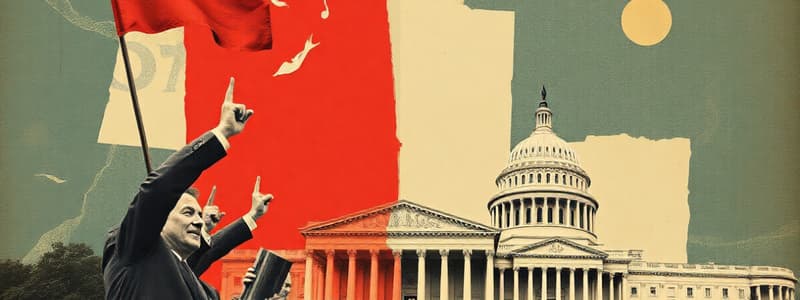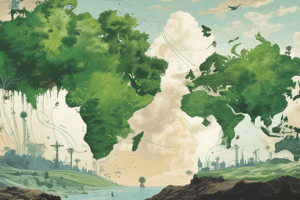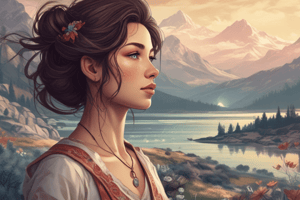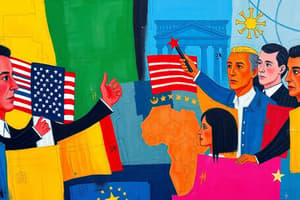Podcast
Questions and Answers
What are the three institutions that play a key role in major decisions?
What are the three institutions that play a key role in major decisions?
Legislature, executive and judiciary.
What is the basic objective of this chapter?
What is the basic objective of this chapter?
- To understand how all the institutions together carry on the work of government.
- To compare these institutions with similar institutions in other democracies.
- To understand the working of the national level government.
- All of the above. (correct)
What was the name of the order issued by the Government of India on August 13, 1990?
What was the name of the order issued by the Government of India on August 13, 1990?
Office Memorandum.
What was the percentage of vacancies reserved for the Socially and Educationally Backward Classes (SEBC)?
What was the percentage of vacancies reserved for the Socially and Educationally Backward Classes (SEBC)?
Who signed the Order?
Who signed the Order?
The Order was quite short and looked like any ordinary circular or notice.
The Order was quite short and looked like any ordinary circular or notice.
What was the name of the Second Backward Classes Commission?
What was the name of the Second Backward Classes Commission?
When did the Commission submit its report?
When did the Commission submit its report?
Who is the head of the State?
Who is the head of the State?
Who is the head of the government?
Who is the head of the government?
What is the name of the national assembly of elected representatives in India?
What is the name of the national assembly of elected representatives in India?
What is the name of the assembly at the state level?
What is the name of the assembly at the state level?
What are the three key functions of the Parliament?
What are the three key functions of the Parliament?
The Rajya Sabha is more powerful than the Lok Sabha because it is called the Upper Chamber.
The Rajya Sabha is more powerful than the Lok Sabha because it is called the Upper Chamber.
What is the key difference between the two houses of Parliament?
What is the key difference between the two houses of Parliament?
Which house has the power to pass a money bill?
Which house has the power to pass a money bill?
The Lok Sabha can reject a money bill passed by the Rajya Sabha.
The Lok Sabha can reject a money bill passed by the Rajya Sabha.
Only a person who enjoys the support of the majority of the Lok Sabha members can be appointed as the Prime Minister.
Only a person who enjoys the support of the majority of the Lok Sabha members can be appointed as the Prime Minister.
What is meant by the 'Political Executive?'
What is meant by the 'Political Executive?'
What is meant by the 'Permanent Executive?'
What is meant by the 'Permanent Executive?'
The President is the most powerful person in the government of India.
The President is the most powerful person in the government of India.
Who has the final power to dismiss a minister?
Who has the final power to dismiss a minister?
The President appoints the Prime Minister without any consultation.
The President appoints the Prime Minister without any consultation.
What is the role of the Cabinet in the government?
What is the role of the Cabinet in the government?
What are the three categories of Ministers in India?
What are the three categories of Ministers in India?
The President of India has the power to veto any law passed by the Parliament.
The President of India has the power to veto any law passed by the Parliament.
What is the system of government in India called?
What is the system of government in India called?
The Chief Justice of India is elected directly by the people.
The Chief Justice of India is elected directly by the people.
What is judicial review?
What is judicial review?
The judiciary in India enjoys high levels of confidence among the people.
The judiciary in India enjoys high levels of confidence among the people.
What is the difference between a coalition government and a single-party government?
What is the difference between a coalition government and a single-party government?
What are the main roles of the judiciary?
What are the main roles of the judiciary?
What is an Office Memorandum?
What is an Office Memorandum?
Flashcards
Policy Decision
Policy Decision
A significant decision made by a government regarding a specific issue, often involving various institutions and procedures.
Institutions
Institutions
Formal structures or arrangements that are responsible for implementing and regulating government policies in a country.
Legislature
Legislature
The law-making body, typically consisting of elected representatives, responsible for creating and modifying laws and policies.
Executive
Executive
Signup and view all the flashcards
Judiciary
Judiciary
Signup and view all the flashcards
Office Memorandum
Office Memorandum
Signup and view all the flashcards
Mandal Commission
Mandal Commission
Signup and view all the flashcards
Parliament
Parliament
Signup and view all the flashcards
Lok Sabha
Lok Sabha
Signup and view all the flashcards
Rajya Sabha
Rajya Sabha
Signup and view all the flashcards
Cabinet
Cabinet
Signup and view all the flashcards
Prime Minister
Prime Minister
Signup and view all the flashcards
Civil Servants
Civil Servants
Signup and view all the flashcards
Supreme Court
Supreme Court
Signup and view all the flashcards
Judicial Review
Judicial Review
Signup and view all the flashcards
Independent Judiciary
Independent Judiciary
Signup and view all the flashcards
Coalition Government
Coalition Government
Signup and view all the flashcards
Presidential System
Presidential System
Signup and view all the flashcards
Parliamentary System
Parliamentary System
Signup and view all the flashcards
President
President
Signup and view all the flashcards
Cabinet Minister
Cabinet Minister
Signup and view all the flashcards
Reservations
Reservations
Signup and view all the flashcards
Study Notes
Working of Institutions
- Democracy involves more than just electing rulers; rulers must adhere to rules and procedures, working within established institutions.
- Major decisions are made and implemented through interactions among legislature, executive, and judiciary.
- Institutions are fundamental to a functioning democracy, including handling disputes and resolving conflicts.
- Institutions are assessed by their functioning in terms of democracy and their connectedness to other institutions.
- The national level government, commonly referred to as the Central Government or Union Government, serves as the primary subject of this chapter.
- The chapter invites learners to consider examples from their own state governments.
How Is a Major Policy Decision Taken?
- Government orders, such as Office Memoranda, are frequently issued.
- These orders often address various matters and can be lengthy documents.
- They are typically signed by specific officers within the government.
- Office Memoranda can sometimes become controversial and spark disputes.
- The process often involves steps like report reviews, recommendations from committees, and discussion in Parliament.
- The example focuses on the 27% reservation policy for socially and educationally backward classes.
The Decision Makers
- Key governmental actors involved in the decision-making process are the President, Prime Minister, and Parliament.
- The decision-making process often extends beyond the individual signing the document, involving numerous other officials.
- This example is from the working of the Union government.
- It's vital to understand how these bodies interact during policy implementation and decision-making.
Need for Political Institutions
- The chapter highlights the significance of institutions in governing.
- It addresses how institutions, such as the Cabinet, Civil Servants, and Supreme Court, function for effective governance.
- These institutions are crucial for resolving conflicts and disputes within the governance framework.
- The importance of institutions lies in their ability to maintain order and fairness in decision-making.
Parliament
- Parliament is the supreme political body, representing public sentiment.
- Parliament exercises significant power in lawmaking and government oversight.
- Parliament plays a vital role in controlling the government's spending.
- The chapter emphasizes the specific role Parliament plays in approving government decisions, including legislative processes.
- It includes the concept of the Parliament as the ultimate authority in a democracy.
- The chapter mentions the composition of Parliament (Lok Sabha and Rajya Sabha) and the significance of a majority.
- The power dynamics between Lok Sabha and Rajya Sabha are detailed.
- Parliament is responsible for creating laws and oversight of government actions.
Political Executive
- The political executive (Prime Minister, cabinet) directly derives authority from the people.
- Institutions play a critical role in a democracy, ensuring checks and balances to power.
- The relationship and balance of powers between different political bodies within a government are crucial.
- Civil servants form the permanent executive body, supporting political leaders in carrying out daily governance functions.
The Judiciary
- The judiciary (Supreme Court, High Courts, and District Courts) is an independent institution responsible for upholding constitutional principles.
- The judiciary acts as an essential check on the other branches of government, ensuring their actions are within constitutional bounds.
- The judiciary is responsible for interpreting laws, deciding disputes, and reviewing government actions.
- The judiciary is essential for fairness and protection of citizens' rights.
Coalition Government
- Coalition governments arise when no single political party secures a majority.
- These governments necessitate negotiations between diverse parties to create a governing coalition.
- Different viewpoints and priorities within the government are discussed.
Studying That Suits You
Use AI to generate personalized quizzes and flashcards to suit your learning preferences.




